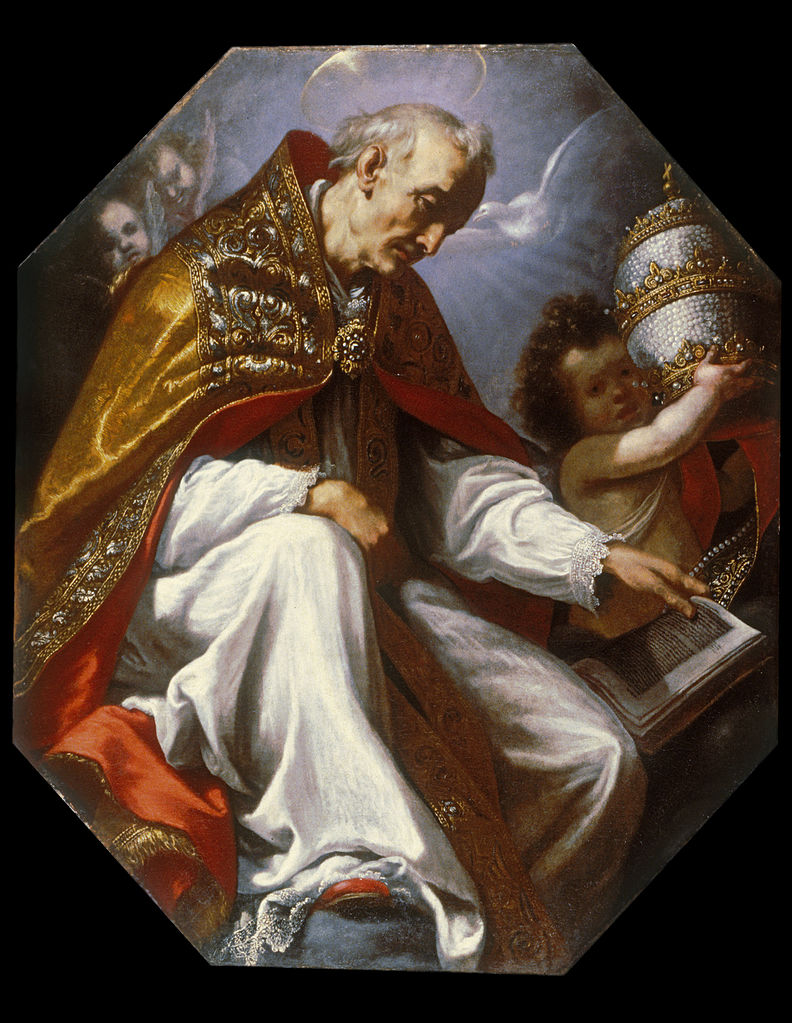
Ad Officium lectionis: Victorius Genovesi
Vittorio Genovesi (1887-1967)
was a Jesuit priest, who won three times the golden medal poeticum Hoeufftianum –
Latin poetry contest.
Rerum
suprémo in vértice
regína,
Virgo, sísteris,
exuberánter
ómnium
ditáta
pulchritúdine.
Princeps
opus tu cétera
inter
creáta prænites,
prædestináta
Fílium,
qui
prótulit te, gígnere.
Ut
Christus alta ab árbore
rex
purpurátus sánguine,
sic
passiónis párticeps
tu
mater es vivéntium.
Tantis
decóra láudibus,
ad
nos ovántes réspice,
tibíque
sume grátulans
quod
fúndimus præcónium.
Patri
sit et Paráclito
tuóque
Nato glória,
qui
veste te mirábili
circumdedérunt
grátiæ. Amen.
You are enthroned at the highest summit of all, O Virgin
Queen, enriched with beauty more abundantly than all. Preeminent in your work you outshine all
other creatures, predestined to give birth to the Son, who brought you forth.
As Christ high upon the tree was a King stained royal purple by his blood, so
you are the Mother of all the living by sharing in his passion. Decked with
such high praises, behold us who celebrate you, and gladly receive the lauds we
pour out to you. To the Father and Paraclete and to you, the Son, glory, who
wondrously adorned and surrounded you with grace. Amen.
Ad Laudes matutinas: saec. IX
In
Breviarium Sacri Ordinis Cisterciensis this
hymn was sung at Terce on all solemnities of the Blessed Virgin Mary. It is interesting that this hymn appears in
the Liturgica horarm not because Mary
is called a ‘queen’ but solely because of the reference to her Davidic descent.
O
quam glorífica luce corúscas,
stirpis
Davídicæ régia proles,
sublímis
résidens, virgo María,
supra
cælígenas ætheris omnes.
Tu,
cum virgíneo mater honóre,
cælórum
Dómino péctoris aulam
sacris
viscéribus casta parásti;
natus
hinc Deus est córpore Christus:
Quem
cunctus vénerans orbis adórat,
cui
nunc rite genu fléctitur omne,
a
quo te pétimus subveniénte
abiéctis
ténebris gáudia lucis.
Hoc
largíre, Pater lúminis omnis,
Natum
per próprium, Flámine Sancto,
qui
tecum nítida vivit in æthra
regnans
ac móderans sæcula cuncta. Amen.
O with what glorious light you shine, royal
offspring of the branch of David, enthroned on high, O Virgin Mary, over all
the heavenly born. You, a mother honored with virginity, your heart a palace
for the Lord of heaven, you prepared a place for him within your holy womb,
there the God-Christ was born in a body. He whom all the world worships and
adores. Before whom every knee is rightly bended, from whom, we ask you that by
your intervention you dispel the darkness with the joy of light. Grant this, O
Father of all light, through your Son in the Holy Spirit, who with you lives in
heavenly brightness, ruling and governing all things. Amen.
1. O how glorious art thou, dazzling with light,
stock of David, royal offspring!
Thou dwellest in a sublime height, O Virgin Mary,
Looking down on all the heavenly regions.
2. Thou, with the honor of being a virgin and
mother,
hast prepared for the Lord of Angels thy bosom
as a sacred palace, thy most holy womb,
from whence God took flesh, and was born Christ.
3. Thou, whom the whole world venerates and pays
homage,
before whom all now rightfully bend the knee,
To whom we humbly beseech in our misery and
darkness,
coming before thee surrounded by the joy of pure
light.
4. O Father of all lights, through this sacred Flame
give unto us thy only Begotten Son,
who with Thee reigns brilliantly in the heavens,
ruling and governing for all ages.
Amen.
Ad Vesperas: saec. XII
Mole
graváti críminum
ad
te, regína cælitum,
confugiéntes,
póscimus
nostris
ut adsis précibus.
Ætérnæ
vitæ iánua,
aurem
nobis accómmoda,
per
quam spes vitæ rédiit,
quam
Eva peccans ábstulit.
Tu
princeps, mater Príncipis,
vitam
depósce fámulis,
et
pæniténdi spátia
nobis
indúlgens ímpetra.
Oránte
te, sanctíssima,
sanctórum
orant ágmina;
tuis,
regína, précibus
conciliétur
Dóminus.
Regnátrix
mater ómnium,
vota
comple fidélium,
ac
vitam nos post frágilem
ad
veram perduc réquiem.
Sit
laus Patri cum Fílio
et
Spíritu Paráclito,
qui
te præ cunctis cælica
exornavérunt
glória. Amen.
Weighted down by the burden of our sins, fleeing
to you, O Queen of heaven, we ask that you hear our prayers. Door of eternal
life, turn your ears to us, though whom the hope of life returned, which Eve in
sin had lost. You, the Princess, Mother
of the Prince, give life to your servants and room for repentance, prayer for
our forgiveness. When you pray, O Most Holy, the whole company of the saints
pray; by your prayers we are reconciled to God. Queen, Mother of all people,
fulfill the prayers of the faithful, and after this fragile life lead us to
true rest. Praise be to the Father with
the Son, and to the Spirit the Comforter, who has adorned with heavenly glory
beyond all others. Amen.










